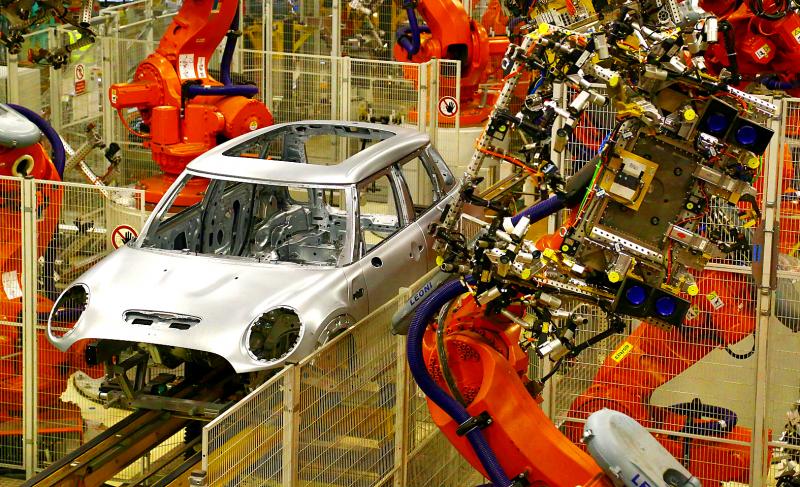Affected by the COVID-19 pandemic, German automaker BMW AG on Tuesday cut its financial forecasts, saying it expects sales to be “significantly down” this year compared with last year, prompting earnings to “deteriorate, particularly in the first half.”
Profit margins in the group’s automotive segment are likely to fall to a range between zero and 3 percent, rather than between 2 and 4 percent as previously expected, it said.
“Uncertainty surrounding the global spread of coronavirus and its consequences make it difficult to accurately forecast,” BMW said, sticking to its expectations of pretax profit “significantly below” last year’s levels.

Photo: AFP
“The highest negative impact is expected in the second quarter of 2020,” BMW said.
The automaker yesterday reported a first-quarter net profit down only slightly on last year’s levels as the novel coronavirus slashed sales, but the comparison was distorted by a massive charge that hit the manufacturer last year.
In January-to-March, BMW sold 21 percent fewer vehicles year-on-year at 477,000, even as its bottom line fell just 2.4 percent to 574 million euros (US$620 million).

Photo: Reuters
Now, “we are gradually ramping up our production again according to demand in each market,” BMW chief executive Oliver Zipse said, adding that “liquidity has absolute priority in this situation.”
The Munich-based group has slashed the amount it plans to invest over the course of this year from almost 6 billion euros to “less than 4 billion” euros, Zipse added.
“In view of the current situation, we will either put certain projects on hold or subject them to further review,” he said.
Separately, Fiat Chrysler Automobiles NV on Tuesday reported a first-quarter net loss of 1.7 billion euros due to a steep decline in vehicle sales triggered by the pandemic, and said the impact on the second quarter would be even more severe.
The automaker has withdrawn full-year earnings forecasts due to the volatility of the virus-provoked economic crisis, which includes stalled production and shuttered dealerships.
However, it said that an internal stress-test indicates it could survive a 50 percent reduction in volumes by slashing costs and cash burn.
Fiat CEO Mike Manley told analysts that despite the crisis, the terms of a full merger deal with French automaker PSA Peugeot had not been changed, and that the aim remains to complete it by the end of this year or early next year.
The first-quarter loss compared with earnings of 619 million euros during the same period last year. Revenue sank 16 percent to 20.5 billion euros, as global shipments slumped 21 percent to 818,000, with production suspended in all regions and global demand collapsing.
Manley said the company expects a net loss and “significant’’ negative cash flows’’ in the second quarter.
“The pandemic and its impact is here for the foreseeable future, and it has caused us to rethink our entire business model,’’ Manley said, adding that the recovery would depend on what economic incentives governments devise.
Additional reporting by AP

WEAKER ACTIVITY: The sharpest deterioration was seen in the electronics and optical components sector, with the production index falling 13.2 points to 44.5 Taiwan’s manufacturing sector last month contracted for a second consecutive month, with the purchasing managers’ index (PMI) slipping to 48, reflecting ongoing caution over trade uncertainties, the Chung-Hua Institution for Economic Research (CIER, 中華經濟研究院) said yesterday. The decline reflects growing caution among companies amid uncertainty surrounding US tariffs, semiconductor duties and automotive import levies, and it is also likely linked to fading front-loading activity, CIER president Lien Hsien-ming (連賢明) said. “Some clients have started shifting orders to Southeast Asian countries where tariff regimes are already clear,” Lien told a news conference. Firms across the supply chain are also lowering stock levels to mitigate

IN THE AIR: While most companies said they were committed to North American operations, some added that production and costs would depend on the outcome of a US trade probe Leading local contract electronics makers Wistron Corp (緯創), Quanta Computer Inc (廣達), Inventec Corp (英業達) and Compal Electronics Inc (仁寶) are to maintain their North American expansion plans, despite Washington’s 20 percent tariff on Taiwanese goods. Wistron said it has long maintained a presence in the US, while distributing production across Taiwan, North America, Southeast Asia and Europe. The company is in talks with customers to align capacity with their site preferences, a company official told the Taipei Times by telephone on Friday. The company is still in talks with clients over who would bear the tariff costs, with the outcome pending further

Six Taiwanese companies, including contract chipmaker Taiwan Semiconductor Manufacturing Co (TSMC, 台積電), made the 2025 Fortune Global 500 list of the world’s largest firms by revenue. In a report published by New York-based Fortune magazine on Tuesday, Hon Hai Precision Industry Co (鴻海精密), also known as Foxconn Technology Group (富士康科技集團), ranked highest among Taiwanese firms, placing 28th with revenue of US$213.69 billion. Up 60 spots from last year, TSMC rose to No. 126 with US$90.16 billion in revenue, followed by Quanta Computer Inc (廣達) at 348th, Pegatron Corp (和碩) at 461st, CPC Corp, Taiwan (台灣中油) at 494th and Wistron Corp (緯創) at

NEGOTIATIONS: Semiconductors play an outsized role in Taiwan’s industrial and economic development and are a major driver of the Taiwan-US trade imbalance With US President Donald Trump threatening to impose tariffs on semiconductors, Taiwan is expected to face a significant challenge, as information and communications technology (ICT) products account for more than 70 percent of its exports to the US, Chung-Hua Institution for Economic Research (CIER, 中華經濟研究院) president Lien Hsien-ming (連賢明) said on Friday. Compared with other countries, semiconductors play a disproportionately large role in Taiwan’s industrial and economic development, Lien said. As the sixth-largest contributor to the US trade deficit, Taiwan recorded a US$73.9 billion trade surplus with the US last year — up from US$47.8 billion in 2023 — driven by strong